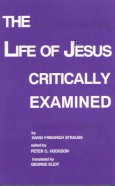|
|
Classic Reprints and Out-of-Print |
|
Reprint Spotlight: The Life of Jesus Jesus'
Proclamation of
- Select new &
used Contact Information:
More detailed information may be found in the Order Information section. |
The
Life of Jesus Critically Examined
by David Friedrich Strauss
 |
List Price: Paperback Paperback - 812 pp
|
|
The Hodgson edition makes available nor only George Elliot's translation of the fourth edition, but also provides an excellent introduction, useful notes, and translations of Strauss's prefaces to all previous German editions. Of these, the capital preface to the still untranslated third edition, in which Strauss accommodated his views in the direction of Schleiermacher, is especially instructive. No student of 19th or 20th century theology can ignore this book. Leander E. Keck The two-volume LIFE OF JESUS by David Freidrich Strauss in 1835 is one of the landmark treatments in Leben-Jesu research. It is good to have it back in print in the translation of Mary Ann Evans (novelist George Eliot) and with the detailed introduction by Peter Hodgeson, providing setting in the lifetime of Strauss and analysis of his subsequent editions. Older assessments saw in Strauss roots for later eschatological concerns, form and redaction criticism. We can now note that he paid considerable attention to narrative, deconstructed many a pericope, and sought the idea behind the imageries. So caught up in his critical, negative analysis did Strauss become that he provided only in a "Concluding Dissertation" his attempt to "reestablish dogmatically what had been destroyed." It is a book that cost Strauss his career in a Swabian tragedy, but it sent studies of Jesus in new directions, with impact even till today. John Reuman
|
|
|
|
